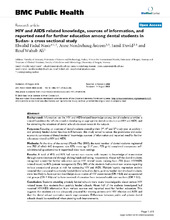HIV and AIDS related knowledge, source of information, and reported need for further education among dental students in Sudan- a cross sectional study
Peer reviewed, Journal article
Published version
Permanent lenke
https://hdl.handle.net/1956/8721Utgivelsesdato
2008-08-14Metadata
Vis full innførselSamlinger
Originalversjon
https://doi.org/10.1186/1471-2458-8-286Sammendrag
Background: Information on the HIV and AIDS-related knowledge among dental students provides a crucial foundation for efforts aimed at developing an appropriate dental curriculum on HIV and AIDS, and for attracting the attention of dental school educators towards the subject. Purposes: Focusing on a census of dental students attending their 3rd, 4th and 5th study year at publicly – and privately funded dental faculties in Khartoum, this study aimed to assess the prevalence and socioeconomic correlates of dental students' knowledge, sources of information and reported need for further education related to HIV and AIDS. Methods: At the time of the survey (March–May 2007), the total number of dental students registered was 782 of which 642 (response rate 82%, mean age 21.7 year, 72% girls) completed anonymous selfadministered questionnaires in supervised class room settings. Results: A total of 49% and 86% had correct sum scores with respect to knowledge of transmission through contamination and through shaking hands and eating, respectively. About half the dental students recognized a need for further education across HIV related issues, varying from 75% (basic HIV/AIDS related issues) to 84% (patient management). Only 38% of the students had correct sum scores regarding various occupational groups at risk for contacting HIV and AIDS. Multiple logistic regression analysis revealed that compared to privately funded dental school students, publicly funded dental school students were less likely to have correct knowledge about modes of HIV transmission (OR = 0.6) and occupational risk groups (OR = 0.6) and to have received information from lectures/health care workers (OR = 0.5). Conclusion: Students attending privately funded schools were more knowledgeable about various HIV related issues than students from publicly funded schools. About half of the students investigated had received HIV/AIDS information from various sources and reported need for further education. This suggests that students are not adequately prepared for treating patients with HIV infection and AIDS and that the dental school curriculum needs improvements. Differences between public and private dental schools should be considered when planning such improvements.
Utgiver
BioMed CentralTidsskrift
BMC Public HealthOpphavsrett
Copyright 2008 Nasir et al; licensee BioMed Central Ltd.Elwalid Nasir et al.; licensee BioMed Central Ltd.

